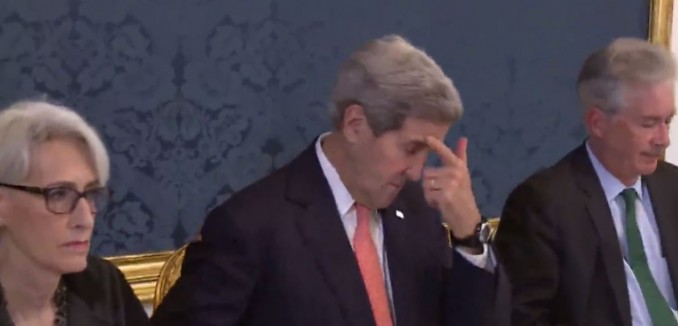VIENNA – With only a day to go before the deadline to reach an agreement over the future of Iran’s nuclear program, Western and Iranian news media are making dramatically different claims over how negotiations will conclude.
A report in Iran’s semi-official Fars News Agency claimed that a “political agreement” would be announced tomorrow, and Iranian officials signaled a “willingness” to extend negotiations for up to another year, along terms similar to those of the soon to expire Joint Plan of Action.
Western diplomatic sources in Vienna have categorically slapped down Iranian claims of an agreement of any kind, though not ruling out an extension of the talks past tomorrow’s deadline. “There will be no framework or political agreement, period,” a Western diplomat said, adding that reaching a comprehensive deal is simply impossible at this point.
Later reports in the Farsi-language Iranian press suggested the two sides would settle on a “non-paper,” which would usher in an additional phase of negotiations, described as lasting two months.
Sources also tell The Tower that the Iranian negotiating team has delivered a long list of demands before it will agree to an extension of talks – including dozens of airplanes and heavy oil drilling equipment.
The state of these developments appears in part to mirror what occurred during last year’s negotiations in Geneva. Last fall, the parties announced an agreement that made major concessions to Iran, even before the Joint Plan of Action was agreed upon over the following two months, which resulted in a massive windfall for Tehran of over $8 billion in sanctions relief. The IAEA’s director-general said on Thursday that Iran still refuses to fully comply with its obligation under the Joint Plan of Action to come clean about its past military nuclear work.
“Javad Zarif should teach a course at Evil University in negotiation tactics,” said Josh Block, CEO of the The Israel Project, speaking in Vienna about the Iranian nuclear negotiator and his team. “He could call the class ‘How to get just about everything while giving-up nothing.”
The Israel Project publishes The Tower.
Reports indicate that the West has already conceded to Iranian demands on the fate of the heavy-water reactor in Arak.
But according to an analysis by The Tower, there are several unreported areas in which the Obama administration is reportedly willing to make, or has already made, significant concessions to Iran a comprehensive deal — concessions so dire that they imperil the value of any meaningful deal.
Structure of the Deal
The deal offers upfront sanctions relief with a “snapback.” The deal also expires after ten years, leading to concerns that such a deal will merely put the region on a 10-year path to nuclear confrontation. Iran’s opening offer was a deal lasting three years; the West originally proposed 30.
Uranium
The West has given up on trying to achieve significant concessions from Iran that they have previously demanded publicly. They have given up demanding that Iran have zero nuclear enrichment capabilities, conceding to Iran the ability to enrich uranium. Iranian president Hassan Rouhani has previously stated that any country that can produce uranium for nuclear fuel can make nuclear weapons.
The West has also given up on demanding that Iran dismantle its existing nuclear infrastructure. This, combined with concessions on the scope of Iran’s centrifuge cascades, will allow Iran to close their “breakout time” to manufacture a nuclear weapon undetected by making sure there is sufficient equipment on hand to do the enriching.
Finally, the West has given up on demanding that Iran not have the capability to do research, development, and construction of advanced centrifuges. Throughout these negotiations and in the future, Iran will be able to continue building and stockpiling centrifuges, which will allow them to close their breakout time by speeding up the enrichment process.
Plutonium
As previously reported, the West has given up on the demand to fully convert the heavy-water plant at Arak into a light-water reactor. This will leave Iran with the capacity to use Arak’s features to build a plutonium bomb. The West has reportedly proposed a change to Arak that is easily reversible (the so-called Princeton plan), which will allow Iran to continue plutonium production undetected to the casual observer.
Ballistic Missiles
Any discussion of Iran’s intercontinental ballistic missiles has been taking off the table, allowing Iran the freedom to expand from merely threatening the Middle East to having the capacity to attack Europe and the United States.
[Photo: PressTV News Videos / YouTube]




